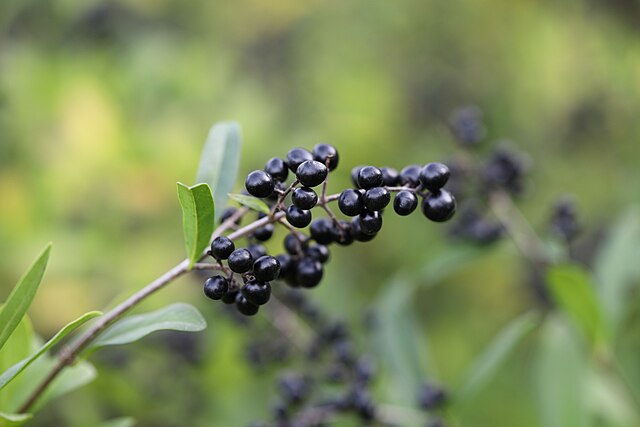
Spring has sprung in Toronto and it certainly feels like it. Everything is greener now, and flowering trees and bushes are blooming. Why are we suddenly walking through a greener world? Because it has been raining almost constantly for the past few weeks. There’s nothing like a warm rain to stimulate rejuvenation.
As the saying goes, “April showers bring May flowers” so it’s hard to complain. If I want the pretty trees and flowers, I’m going to have to accept some rain, and that’s a transaction I’ll accept. But all the rain and moistness does remind me of ligustrum fruit, our featured herb this month.
Ligustrum fruit is an ancient Taoist longevity tonic, and one of the herbs in our Shou Wu Plus tincture. It is considered a yin tonic, and like all yin tonics it soothes and extends the life of certain major organs, particularly our liver and kidneys. It is soothing because it is cooling and moistening, and subdues inflammation.
As we age, we tend to become drier and more brittle. Our muscles and tendons tense up and can become cramped and injured more easily. Regular exercise will keep our blood circulating well so that our organs and tissues continue to be invigorated. However, herbs like ligustrum fruit can provide an invaluable assist, adding in extra moisture to heal and resolve these symptoms of dryness.
According to Chinese medicine, ligustrum fruit not only tonifies liver and kidney yin (nourishing and moistening those organs), but it also restores “jing”. Jing, otherwise known as “essence”, is the energetic bank account we are all born with, and which varies from individual to individual, depending on our constitutional inheritance. It’s the internal juice that we dip into whenever we push ourselves beyond our limits. It fuels our “second wind”.
The more we strain and extend ourselves in life, the more our energetic bank account is depleted. Jing can be depleted by having too many children without enough recovery in between, by engaging in sexual activity too frequently, or simply through long-term stress and overwork. Understandably, if we want to have a long and healthy a life, we want to preserve our jing as much as possible and dip into it only when absolutely necessary.
By middle age, most people start to notice that their jing is being depleted. Common signs are; forgetfulness, hair loss, blurry vision, deafness, premature greying, incontinence, infertility, sterility, menopausal hot flashes, osteoporosis, and diseases like Parkinson’s. The sooner you start seeing these signs of aging, the more quickly you are burning through your jing bank account. If this is happening to you, I would recommend making some adjustments to your lifestyle, if possible. And an herb like ligustrum can be an invaluable help.
Ligustrum fruit has demonstrated an ability to increase white blood cell counts and thereby stimulate the immune system[1]. It can reduce plasma glucose levels and thereby reverse signs of type 2 diabetes[2]. It can also reduce cholesterol and triglyceride levels[3]. It has natural anti-inflammatory properties[4], and is hepatoprotective, lowering elevated liver enzymes and preventing liver damage due to dryness[5]. It can also stimulate the production of new red blood cells, increasing your energy level[6].
Julia used to prepare ligustrum fruit as a tea with eclipta, another liver and kidney yin tonic. When paired together, these two herbs are commonly used in TCM to lower blood pressure. She would drink multiple cups of this tea on a daily basis, and that may be why she was so spry and energetic well into her 70’s. Customers and friends alike would often comment on her youthful movements.
So, if you’re feeling dry and stiff, consider giving ligustrum fruit a try. As I mentioned above, it is an important ingredient in our Shou Wu Plus tincture, and you can also purchase it in our Shou Wu Tea, or even on its own – just ask if you’re interested! As ligustrum fruit is a yin tonic, its properties are extracted more readily in a water base, like a tea. However, if you’re short on time, the Shou Wu Plus tincture is still beneficial. When restoring your jing, any way you can get that herb into your system is better than nothing!
- 1. Zhong Chang Yao Yan Jiu (Research of Chinese Patent Medicine), 1982; (1):42
- 2. Zhong Guo Zhong Yao Za Zhi (People’s Republic of China Journal of Chinese Herbology), 1992; 17(7):429
- 3. Jin Zhou Yi Xue Yuan Xue Bao (Journal of Jinzhou University of Medicine), 1983; 4(1):40
- 4. Zhong Guo Zhong Yao Za Zhi (People’s Republic of China Journal of Chinese Herbology), 1989; 14(7):47
- 5. Ibid.
- 6. Zhong Yao Tong Bao (Journal of Chinese Herbology), 1983; 8(6):35
About the Author: Rebecca Wong has a BA in English Literature from the University of Waterloo and has been working in the herbal business since 2000. She studied at the Ontario College of Traditional Chinese Medicine under respected authorities Paul Des Rosiers and Vu Le, and graduated from the East West School of Planetary Herbology under Michael Tierra. She received training as a yoga teacher at The Branches in Kitchener/Waterloo, and therapeutic yoga teacher training from the School for Somatic Soulwork under Deniz Aydoslu. She now teaches yoga for anxiety, depression and burnout at Rebecca's Restful Yoga Studio in Toronto.
